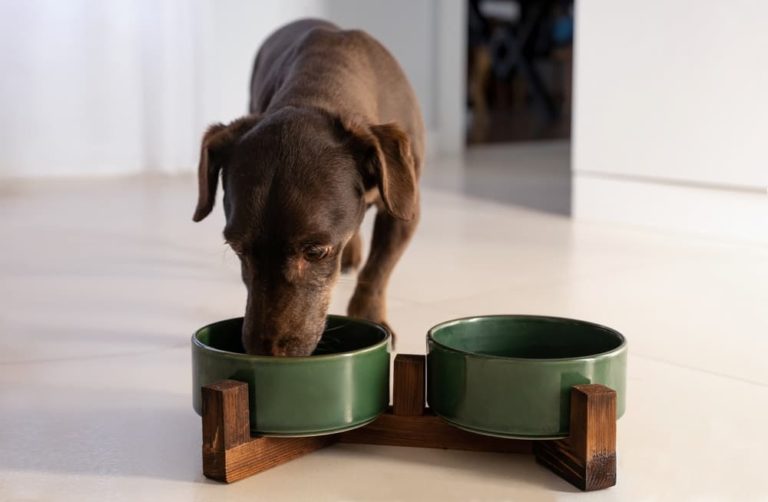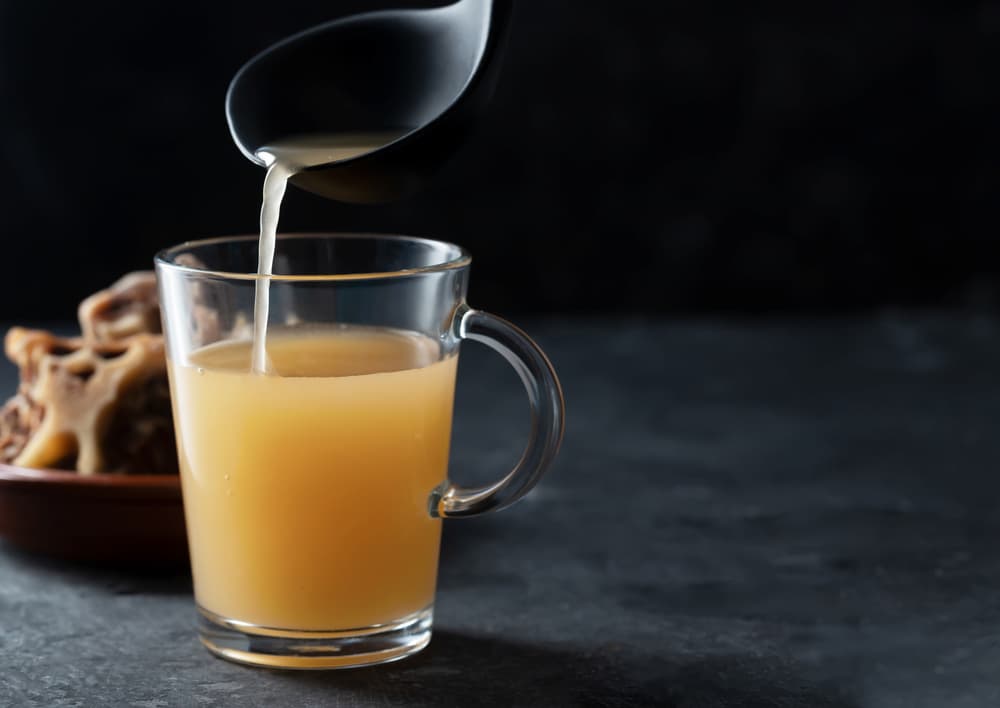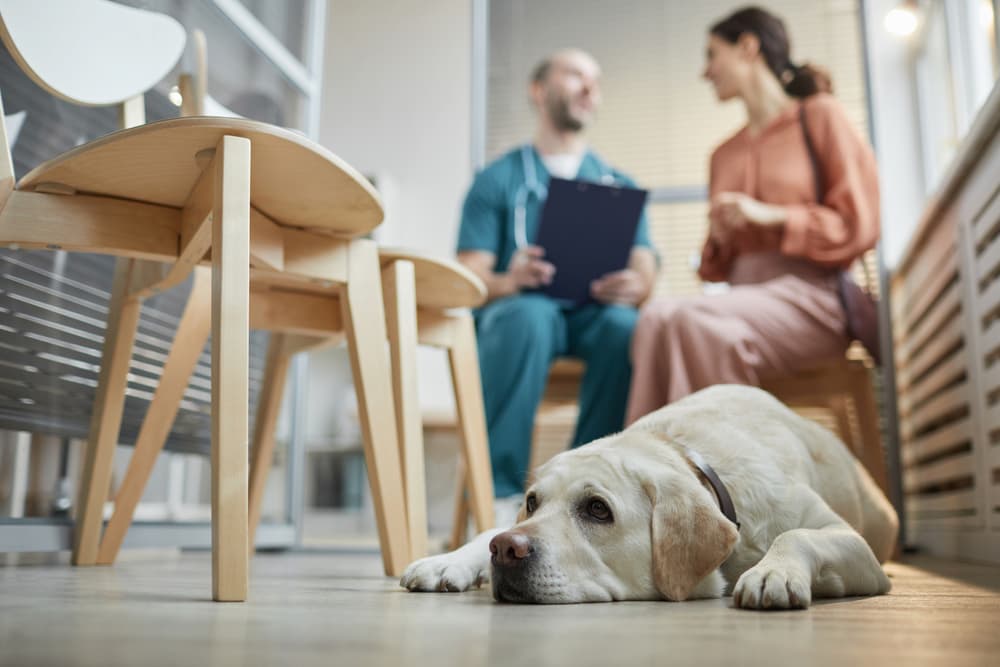Dog Cancer Diet: Food Recommendations and Feeding Tips

If your dog has been diagnosed with cancer, you’re not alone: 1 in 4 dogs will develop abnormal tissue growth at some point in their lives [1]. Thankfully there are teams of professionals working to advance our understanding of cancer in dogs while providing your pup with the best quality of life possible.
“The most common types of cancer affecting dogs are lymphoma and bone tumors,” explains Dr. Alex Schechter, DVM, founding veterinarian at Burrwood Veterinary. “Certain breeds of dogs are more prone to developing certain types of cancer. For example, Labrador Retrievers have a higher rate of liver cancer than any other breed of dog. This can be attributed to a breed’s genetic predisposition to certain types of cancer.”
Dr. Kendra Pope, DVM, founding veterinarian of Prism Integrative Veterinary Health, has spent the last 15 years as a board-certified oncologist and training in holistic and integrative modalities. She believes the management and treatment of cancer in dogs requires a holistic approach, from conventional medicine to food therapy.
While there is no magical dog cancer diet, there are some food recommendations and tips you can take into consideration. What follows is a guide to canine nutrition, cancer, and the science behind diets for dogs with cancer. Once you’ve taken it all in, chat with your veterinarian, veterinary oncologist, and veterinary nutritionist about the right approach for your individual pup.
Dog Cancer Diet: Why It’s Important

Science is limited when it comes to fully understanding the role of nutrition and the management or treatment of cancer. But one thing we know from the study of cancer cells is that they metabolize certain foods better than healthy cells do.
“It’s something called the Warburg Effect,” Dr. Pope explains. Essentially, cancer cells are much more efficient in using the energy of glucose and carbohydrates than a healthy cell is, which means certain diets could fuel the reproduction of cancer faster than some other diets might. The Warburg Effect and its use in slowing the progression of cancer is an active area of research [2].
Dr. Pope adds that a dog undergoing cancer treatment—like surgery, chemotherapy, or radiation—experiences metabolic changes and likely benefits from an individually-tailored diet. The right diet also has the potential to reduce symptoms of the treatment and cancer, like increasing your pup’s energy level, decreasing inflammation, or settling an upset stomach.
Best Food for Dogs with Cancer: Recommendations
If there’s one thing that Dr. Pope can’t stress enough, it’s that there is no one diet for dogs with cancer or even a recommended diet based on your dog’s particular cancer diagnosis. “Nutrition in general, and definitely when it comes to cancer patients, is all about individualized therapy,” Dr. Pope says.
You won’t find a dog food labeled prescription diet for dogs with cancer. But we know cancer cells feed on glucose and carbohydrates while healthy cells readily feed on protein and fats. So, “we often recommend a dog with cancer be fed a diet that is lower in carbohydrates and higher in protein,” Dr. Pope says.
Of course, your veterinarian will consider all of your dog’s dietary needs when making a recommendation—like a low-protein diet if your dog has kidney disease or a low-fat diet if the cancer affects the functions of the pancreas.
“When we use diet as a catch-all, we’re really missing opportunities to provide patients with what they need on an individualized basis,” Dr. Pope adds.
Homemade Dog Food for Cancer

In addition to a low-carbohydrate and low-glucose diet, Dr. Pope encourages pet parents of dogs with cancer to feed a diet that is minimally processed and that uses whole-food ingredients. A homemade diet developed with a veterinary nutritionist is “much less inflammatory than commercially available foods,” she says. The culprit of inflammation in ultra-processed foods, she adds, is high amounts of advanced glycation end-products (AGEs) (a glucose by-product) and lots of carbohydrates [3].
A homemade diet gives you greater control of what your pet is eating, Dr. Schechter adds. But it’s not to say that it doesn’t come with a greater amount of work in the kitchen and expenses. Plus, the best homemade food for dogs with cancer (or any dog) is one that’s made in close coordination with a board-certified nutritionist for a complete and balanced meal tailored to your dog’s needs. A homemade diet made without such expert guidance is likely to be nutritionally unbalanced and may be harmful to your pet’s health and their ability to fight their cancer.
Best Commercial Dog Food for Cancer
Luckily for us and our pets, there have been huge improvements in the pet food industry that can provide dogs with cancer an optimal diet. “Moving away from high-heat and ultra-processed diets to less processed whole food diets is really important,” Dr. Pope says.
It’s not about recommending any one type of commercial dog food for cancer over another, but instead finding the most minimally processed food that a pet parent can afford and that is safe for the pet. Dogs with cancer likely have a compromised immune system from chemotherapy, steroids, or other reasons. The bottom line is that switching a dog who has been fed kibble their entire life to a raw diet when undergoing immune-suppressing treatment like chemotherapy would be a “recipe for disaster,” Dr. Pope says.
Instead, she says, reach for steamed or dehydrated dog foods if your dog is typically kibble-fed. Also on her list of recommendations are high-pressured processed or cold-pressured processed dog foods. “That means that they’re sterilized the same way juices are sterilized. There’s never heat applied and they use pressure to address any bacteria in the food,” Dr. Pope explains. “Any bacteria present is inactivated.” However, it is also important to remember that the nutrients in cooked foods are generally more digestible and dogs with cancer need all the nutrients they can get.
What to Feed a Dog with Cancer Who Won’t Eat

First, talk to your veterinarian or oncologist about the changes you might expect to see in your dog’s appetite as treatment begins or the disease progresses. They may prescribe an appetite stimulant or anti-nausea medication to reduce your pup’s symptoms.
Then, talk to your veterinarian and board-certified veterinary nutritionist about tweaking your dog’s diet. Frequent changes when your pet isn’t feeling well could lead to food aversion.
Switch up your dog’s diet. If approved by your veterinarian, try a different brand of food, texture, or processing method. When transitioning to a new dog food, always do so slowly, gradually adding more of the new food and less of your dog’s old one.
Warm up your dog’s meal. A dog’s nose is many times more powerful than ours, but health conditions and medications can impact a pup’s super-smelling abilities [4, 5]. Because dogs rely on the sense of smell to provoke appetite, a loss of smell could mean no longer wanting to chow down on a favorite food. Warming up your dog’s meal could be enough to increase the odor and provoke an appetite.
Add a topper. Who said adding a delicious topper that your dog will love can’t be nutritious? Toppers come in a variety of formats, from gravies and broths to powders and freeze-dried morsels. Try serving bone broth warm for an extra-enticing scent!
What to Avoid in a Cancer Diet for Dogs
Besides carbohydrates and glucose, certain nutrients or vitamins could interfere with your dog’s cancer treatment. This is individually based and depends on the type of treatment your dog is undergoing and other health conditions they may have.
For example, some chemotherapies work by creating free radicals that kill cancer cells. Antioxidants are known for their free-radical neutralizing abilities—exactly what you don’t want during these free-radical-dependent cancer treatments.
“Generally speaking, when we’re talking about antioxidants, if they’re coming from food sources the chances and strength of them interfering with chemotherapy is negligible,” Dr. Pope says. “The space where we need to be cautious, and mindful is when we’re talking about supplementing.” Bottom line, speak to your veterinarian before introducing anything new to your dog’s diet and always tell your oncologist about all the foods, medications, supplements, and treats your dog gets.
Dog Cancer Diet: Other Tips and Advice

Whether your dog has been diagnosed with cancer, is in remission, or you want to feed your dog a diet that has cancer-preventing properties, “we would still reach for the same things,” Dr. Pope says, as we would for people. In the case of adding in beneficial supplements like mushrooms or turmeric, “we would just do it in much lower doses,” she adds.
The most important takeaway about nutrition and your dog’s health is to work with a trusted veterinarian and board-certified veterinary nutritionist for an individualized plan. “It’s really important for pet parents and veterinarians to find people they trust to collaborate with,” Dr. Pope says. “Pet parents can go it alone, but as you can imagine, there’s a risk they can potentially do harm, or the results are not going to be as good as if they had a professional working with them.”









